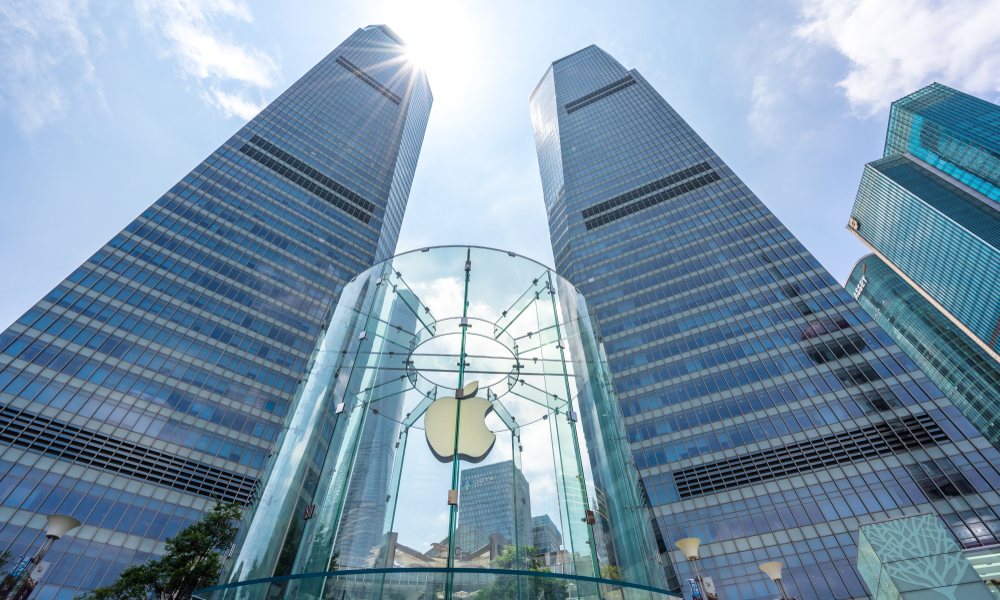Apple’s Reach for Services Doesn’t Extend to China
 Credit: THINK A / Shutterstock
Credit: THINK A / Shutterstock
Toggle Dark Mode
Apple has managed to do a much better job than most of its competitors when it comes to navigating the twisting waters of Chinese regulation, censorship, and commerce, but it’s by no means been an easy run, and as smartphone sales have flagged worldwide, Apple has been reinventing itself as a services company.
China represents a huge portion of the market for new technologies and services, and yet it’s one of the most awkward and complicated countries to do business in.
Earlier this year, we already saw how Apple has a massive iPhone problem in China, and it’s not clear yet that it’s been able to solve that with this year’s iPhone 11 releases, which still seem to be priced out of the reach of most Chinese consumers.
Apple’s push into launching its services business this year hasn’t fixed its China problem either, since none of its new services are available in that country, cutting out hundreds of millions of potential subscribers.
Over 100 Countries — But Not China
Apple has always led the pack among tech companies in offering big international launches right out of the gate. Apple TV+ launched last Friday in over 100 countries, and earlier this fall Apple Arcade launched in over 150. By comparison, when Disney’s new Disney+ streaming service launches next week, it will be available in only three — the U.S., Canada, and the Netherlands — rolling out to Australia and New Zealand a week later.
Not only have Apple TV+ and Apple Arcade been made available in this massive list of countries, but it’s not a token release either — Apple is ensuring that they’re accessible to local users, offering audio dubs for its TV shows and movies in seven languages and subtitles in more than 40, and requiring Apple Arcade game developers to localize their game into 17 different languages.
Despite this, however, Apple TV+, Apple Arcade, and even Apple News+, aren’t available in China, and likely aren’t coming anytime soon. This cuts out a huge portion of Apple’s potential subscriber base for its services, and according to a new report from Bloomberg, some analysts are uncertain what this means about Apple’s future in that country, and whether it could ultimately suffer the fate of rivals like Google and Facebook, which have basically pulled out of China entirely.
While earlier reports that Apple TV+ would gain 100 million subscribers in the first year seemed conservative, since they were based on 220 million iPhones being sold, all of which would include free trials, they may not have been all that unrealistic when you consider how many of those new devices will be sold in China, where even a free trial to Apple TV+ isn’t going to be an option.
Apple Services in China
The only revenue-generating subscription services that Apple is able to offer in China right now are Apple Music and iCloud storage plans, and while the App Store is readily available, it’s tightly censored, and Apple was forced by the Chinese government to shut down its iTunes Movies and Books stores back in 2016, only six months after they first debuted in that country. The iTunes Music Store was similarly axed way back in 2008, and has never returned, despite the availability of Apple Music.
Although Apple Pay is available in China, which generates some revenue for Apple, it’s unclear whether the Apple Card itself will ever be able to come to that country either, not just because of government regulation but also the complexities of the Chinese financial and banking economy and the dominance of government-backed rivals like Alipay and WeChat. Of course the Apple Card has yet to launch outside of the U.S., making it a less important piece of Apple’s services revenue at this point.
To give an idea of how big the Chinese market is for Apple, analysts note that despite the relative dearth of its services available in China, it actually accounts for 10 percent of Apple’s services revenue globally. In other words, Apple Music, iCloud storage, the App Store, and Apple Pay alone are make up one tenth of the money that Apple makes from all of its services worldwide. China similarly still accounts for 18 percent of iPhone sales worldwide, according to Dan Ives, an analyst at Wedbush Securities.
The lack of Apple TV+ in China doesn’t seem all that surprising, however, considering Apple’s struggles selling movies in that country, although there have been reports that Apple has told its producers to tiptoe around the Chinese government in its shows, although by all reports that’s also a fairly common theme in Hollywood, even for content that’s not expected to be shown in China.
For Apple Arcade, on the other hand, the Chinese government expects to exercise the same censorship over the games that Apple publishes on the service as it does on the App Store, and has reportedly started placing more obstacles in Apple’s approval process for standard games, so it’s unlikely that Apple Arcade would be any easier to pull off.
China also hasn’t been shy about killing off apps on the Chinese App Store, reportedly having ordered Apple to take down more than 500 apps in the second half of last year alone, and Apple has been walking a similarly dangerous line in Hong Kong recently, pulling controversial apps at the behest of the mainland Chinese government in what is seemingly an attempt to quash pro-democracy protesters.
Still, a lot of analysts are optimistic about Apple’s future in China, believing it’s only a matter of time before the Chinese government is forced to cave to economic forces and begin opening the doors to services from Apple and others. As Ivan Feinseth, chief investment officer at Tigress Financial Partners notes, “You can only hold back access to information for so long.”






